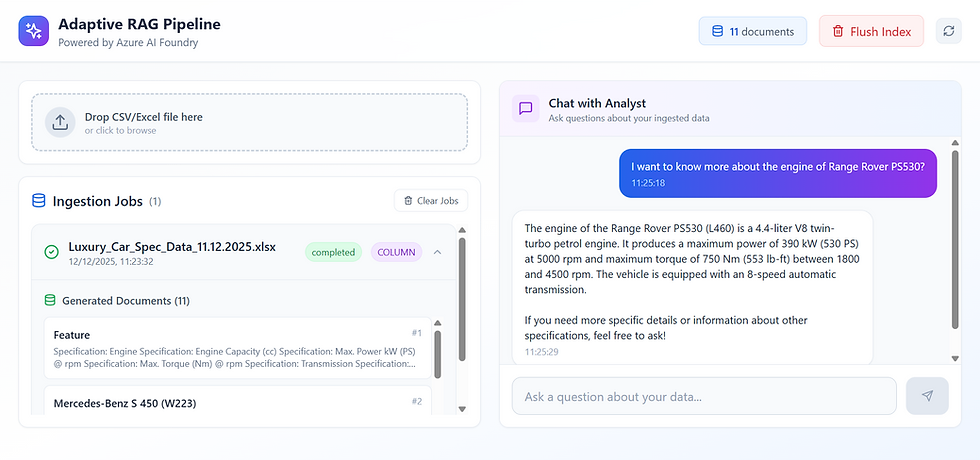AI Agents: A Pre-Cursor to the Future
- Ashish Arora
- Dec 20, 2024
- 4 min read
Updated: Dec 26, 2024

What is Intelligence?
Let's start simple. Intelligence—what does it mean, really? Wikipedia says, "Intelligence has been defined in many ways: the capacity for abstraction, logic, understanding, self-awareness, learning, emotional knowledge, reasoning, planning, creativity, critical thinking, and problem-solving." Sounds like a mouthful, right? But in plain terms, intelligence is all about how well something (or someone) can take in information, make sense of it, and use it to adapt or respond to the world around them.
Now, think about this: as humans, we've been pouring our energy into making machines smarter and better at what they do. And it shows! Machines are now dabbling in all those fancy aspects of intelligence I just mentioned. They can perceive their environment, learn from it, and act intelligently to achieve specific goals. And that's what we call artificial intelligence, or AI for short.
The Journey to AI
AI isn’t one-size-fits-all. Over the years, researchers have explored many paths. Some see AI as a way to augment human abilities, helping us be faster and better. Others chase something more abstract, aiming to create "rational" intelligence—basically, doing the right thing at the right time. But even the word "rationality" is tricky. Does it mean the ability to think deeply and reason? Or does it mean acting intelligently, regardless of what’s happening inside the machine? Food for thought, right?
What is an AI Agent?
Okay, let’s bring this closer to home. Have you ever heard the term "agent"? An agent is simply something that acts. It sees the world around it, figures out what it’s supposed to do, and then gets on with it. An AI Agent does the same but with the added magic of artificial intelligence. This means it’s not just acting; it’s learning, reasoning, and making decisions.
The key thing about an AI agent is its autonomy. How independently can it work? This is what separates the brilliant AI agents from the not-so-great ones—or even the safe ones from the unreliable ones.
What Makes a Good AI Agent?
For an AI agent to truly shine, it needs a mix of skills and abilities. Here are a few critical attributes, along with real-world examples:
Natural Language Processing (NLP): The ability to understand and communicate in human language. For instance, tools like ChatGPT can answer questions, write essays, and hold conversations as if they were human.
Knowledge Representation: The capacity to store and retrieve knowledge effectively. Google Search’s Knowledge Graph is a great example—it connects concepts and provides concise answers by storing relationships between facts.
Automated Reasoning: Using logic to draw conclusions or solve problems. Consider IBM Watson, which has been used in medical diagnostics to analyze symptoms and recommend treatments.
Machine Learning: The ability to learn from data and improve over time. Netflix’s recommendation engine learns your preferences to suggest shows and movies you’ll likely enjoy.
Computer Vision & Speech Recognition: Recognizing and interpreting visuals and sounds. Think of Tesla’s Autopilot system, which uses cameras and sensors to "see" the road and navigate safely.
Robotics: The capability to interact with the physical world. Boston Dynamics’ robots, like Spot, can traverse complex terrain, carry objects, and even dance!
These attributes make AI agents versatile and powerful. Each attribute contributes to their ability to operate independently and adapt to new challenges.
Humans vs. AI Agents: Who’s More Capable?
Here’s where things get fun. Are AI agents catching up to us humans? Can they think like us, reason like us, or even… feel like us? On the flip side, could humans ever catch up to the efficiency and speed of AI agents?
Think about this: machines have access to nearly unlimited data and immense computing power. They’re not limited by memory or distracted by emotions (lucky them). Take DeepMind’s AlphaGo, for example. In a historic Go match against champion Lee Sedol, AlphaGo made a move (Move 37, for the enthusiasts) that human experts initially thought was a mistake. It turned out to be genius and won the game. Or consider Deep Blue’s victory over Garry Kasparov in 1997, marking the first time a computer defeated a world chess champion. Incredible, right?
Wrapping It Up
So, are AI agents better than us? Maybe. Are they just different? Definitely. What’s clear is that the world of AI is evolving at lightning speed, and we’re only scratching the surface of what’s possible. And that’s exactly why this journey into AI agents is going to be so fascinating.
Let me wrap up by reciting the famous quote by Herbert Simon from 1957 (almost 70 years ago):
"It is not my aim to surprise or shock you—but the simplest way I can summarize is to say that there are now in the world machines that think, that learn and that create. Moreover, their ability to do these things is going to increase rapidly until—in a visible future—the range of problems they can handle will be coextensive with the range to which the human mind has been applied."
Stay tuned—this is just the beginning!



Comments